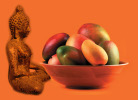You are here
"Eating Animals" by Jonathan Safran Foer
This book was mentioned at our potluck and I was inspired to check it out of the library and learn more.
My husband read it first and I asked him what he thought. He said, "Everyone should read this book." It was written by a fellow who wanted to resolve his own ambivalence about meat. He had become a father and knew he needed to know what was best to feed his son. If they were going to eat animals, he would need to be clear about why. I found it interesting to follow his journey as he looked at the question from every possible angle. While this is non-fiction, the author has also written novels, which has given him an engaging writing style that moved me along. I learned a lot, particularly about the complex lives and emotional capacities of fish and other sea animals, but also about all the land animals. And about myself.
I was struck by his observation that the way we think about animals is not just about animals, it's about us. We have something to learn about ourselves when we explore such questions as why we take certain animals into our homes and hearts and treat others with indifference and cruelty. He looks into the ways we use language to modify our awareness of what we are doing and eating.
Foer clarified for me the difference between those who advocate for animal "rights" versus animal "welfare". He makes the reader wonder about philosophical questions (such as whether the ends justify the means) and face what has happened, not only to the animals but to the people who raise them, as factory farming has taken over animal agriculture. He interviews the farmers who are trying to do it right and delves into the issues there. Finally, he opened my eyes to the quality of the end product: all the chemicals, microorganisms, medicines and other contaminants that fill the cells of the meat product (for instance, chickens are "plumped up" by soaking in wastewater before being wrapped.) More people need to know these facts.
It's a thoughtful, thought-provoking book. I'm glad I read it, even though I had to skip a few pages when I started to feel overwhelmed. He made me think. He tells a lot of truths but is non-judgmental and understands how we get caught in contradictions, each of us trying to work out our relationship with animals, sorting through not only facts but our various habits and traditions. His last chapter, as it turns out, was written just before Thanksgiving and so the book concludes with thoughts about gratitude, turkeys, "the fellowship of the table", and the future of our holidays if we start to change the menu---all very timely for us just now!
